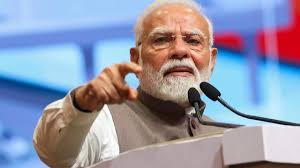PM Modi heading to BRICS, declaration on terror to factor in Pahalgam

New Delhi, July 1, 2025 — Prime Minister Narendra Modi will begin a five-nation diplomatic tour on July 2, with the BRICS Summit in Brazil being the key highlight. Leaders at the summit are likely to issue a strong joint statement on terrorism, specifically referencing the April 22 terror attack in Pahalgam, Jammu & Kashmir.
This summit marks a crucial step in India’s efforts to push for global accountability on cross-border terrorism.
Strategic Goals Behind the Tour
Modi’s itinerary includes Ghana, Trinidad & Tobago, Argentina, Brazil, and Namibia. Each stop will focus on different goals, including trade, diaspora engagement, and regional ties. However, the BRICS Summit on July 6–7 in Rio de Janeiro stands out for its geopolitical significance.
India will take over the BRICS chair at the end of the summit. This puts Modi in a position to set the agenda for the coming year.
Pahalgam Attack Sparks Diplomatic Push
On April 22, terrorists attacked civilians and security forces in Pahalgam, killing 26 people. India has since urged international bodies to name and condemn such attacks clearly.
At a recent SCO summit, India expressed disappointment when some nations resisted naming the Pahalgam attack in the final statement. Now, India sees BRICS as a chance to correct that.
Government sources say the BRICS declaration will directly refer to the Pahalgam incident. If true, it would mark the first time a multilateral forum, including China and Russia, specifically condemns a terror act in Kashmir.
India’s Message: No One Gets a Free Pass
MEA Secretary Dammu Ravi told reporters that India was happy with the draft declaration. “It reflects our clear stance—no one should be spared when it comes to terrorism,” he said.
India has long pushed for global unity on this issue. Modi’s presence will reinforce India’s zero-tolerance approach to terror networks.
Building Stronger Ties with Brazil
In addition to the summit, Modi will meet Brazilian President Luiz Inácio Lula da Silva for a state visit on July 8. The two leaders will discuss defense, counter-terrorism, and trade.
Officials expect new agreements on cybersecurity, military cooperation, and intelligence sharing. Brazil, which currently leads BRICS, has shown support for India’s concerns about terror.
Broader Themes: Reform, Trade, and Expansion
The BRICS agenda also includes calls for reforming global financial systems. India supports building new payment systems to reduce reliance on the US dollar.
Leaders will also discuss:
- Expanding BRICS membership
- Climate cooperation
- Digital innovation
India wants BRICS to follow a fair and inclusive approach as new countries show interest in joining.
Engaging with the Global South
Modi’s earlier visits to Ghana, Trinidad & Tobago, and Argentina will focus on strengthening ties with Indian-origin communities and expanding cooperation in:
- Health and pharma
- Renewable energy
- Digital infrastructure
In Namibia, Modi plans to discuss deals on critical minerals and security collaboration.
A Turning Point for India’s Diplomacy
As conflicts rise globally, India is taking bold steps to lead on issues like terrorism, trade equity, and multilateral reform. Modi’s BRICS visit reflects this assertive approach.
If BRICS names the Pahalgam attack, it would represent a diplomatic win for India. It also signals a shift in how global bodies deal with cross-border terrorism, especially in South Asia.
Conclusion
PM Modi’s BRICS participation goes beyond handshakes and photo ops. It signals a firm demand: global powers must stop ignoring terrorism, no matter where it happens. As India assumes the BRICS chair, it pushes forward a clear vision—terror must be condemned, not excused.
If BRICS leaders include the Pahalgam attack in their declaration, it will reinforce India’s position and challenge nations that shelter terror groups. The outcome could shape how global alliances respond to such threats in the future.






